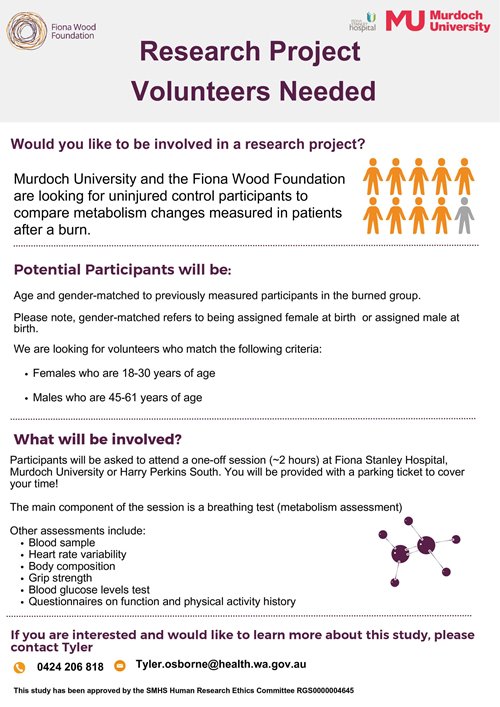Our PhD Researcher, Tyler Osborne, has been leading a study that seeks to understand better the long-term stress on the body caused by non-severe burns with a specific focus on metabolism. This research will enable us to evaluate and identify improvements that can be made to the current clinical care options, which will ultimately improve patient outcomes.
During phase one of the study, we followed a cohort of adult patients who had sustained a non-severe burn injury from admission to 6 months post-burn and collected data associated with different bodily responses, such as:
- Metabolism
- Cardiovascular
- Inflammatory responses
- Musculoskeletal system changes
As we now progress to phase two, we are looking for uninjured participants to take part in the study by attending a one-off session (2 hours) where we will undertake various metabolism assessments (listed below) so that we can compare the results and the changes we measured in patients after a burn.
To do this, we need to age and gender-match previously measured participants in the burned group. Please note that gender-matched refers to being assigned female at birth or assigned male at birth.
We are looking for volunteers who match the following criteria:
- Females who are 18-30 years of age
- Males who are 45-61 years of age
What will be involved?
Participants will be asked to attend a one-off session (~2 hours) at Fiona Stanley Hospital, Murdoch University or Harry Perkins South. You will be provided with a parking ticket to cover your time!
The main component of the session is a breathing test (metabolism assessment)
Other assessments include:
- Blood sample
- Heart rate variability
- Body composition
- Grip strength
- Blood glucose levels
- Questionnaires on function and physical activity history
This vital information will allow us to understand how individual acute stress responses can impact a patient's recovery from a non-severe burn.
If you are interested in participating or would like to learn more about the study, please get in touch with Tyler by phone 0424 206 818 or email tyler.osborne@health.wa.gov.au
This study has been approved by the SMHS Human Research Ethics Committee RGS0000004645

Back to news list